CAPE TOWN (Reuters) - South Africa faces its biggest crisis since readmission to international rugby just a year after finishing third at the World Cup as the side's spiralling decline was confirmed with a 27-13 defeat to Wales on Saturday.
The Springboks looked disorganised, rudderless and devoid of the physical stature that had seen the side crowned world champions in 1995 and 2007.
Coach Allister Coetzee has now presided over the worst year in the history of the side with a record eight defeats from 12 tests and, in the court of public opinion at least, has already been sentenced to an embarrassing early exit from the job.
His position, and a number of other burning issues blamed for this year's dismal performances, will be discussed by South African Rugby (SARU) when their all-powerful general council meets on Dec. 9, according to a statement from the union.
His future looks all the more bleaker after SARU president Mark Alexander admitted the Springboks had "collectively let down our supporters, our commercial partners and our broadcast partner".
It is that view which will weigh heaviest on future decisions as the revenues that flow into the South African game, whether through commercial rights or filling stadiums, are dependant on a winning side.
Alexander said SARU would wait on a report from Coetzee and his staff before taking any decisions but added: "I can assure our supporters and stakeholders that if tough decisions have to be made we will not shy away from making them."
One of the most vexing questions is how to manage the outflow of players from the domestic game to big-money contracts in Europe.
Coetzee, however, feels it is unfair to lay the blame squarely on his shoulders, though he has been unable to come up with answers to the side's deep-rooted problems.
"We've got to understand that it's not just one person that can take responsibility for that," Coetzee told the BBC. "If I'm solely held responsible for that, then I will walk away."
SARU are also planning to unveil structural changes to the domestic game but Alexander admits that first they needed to fix their international brand.

"Our number one priority is a turnaround strategy for the Springbok team and that will be looked at immediately and decisively," he said.